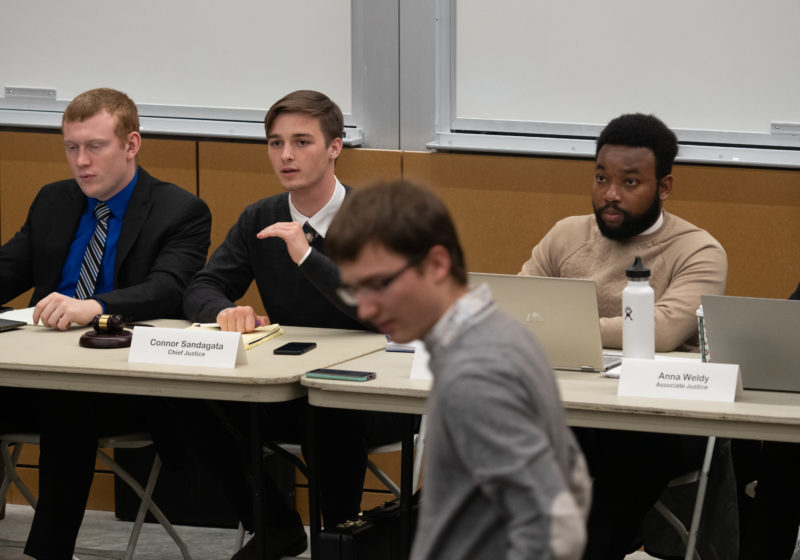Shotokan Karate has filed an appeal against Students’ Association Appropriations Committee (SAAC) to student government’s judicial branch, All-Campus Judicial Council (ACJC), to clear debts incurred since the spring of 2018.
The appeal is based on the grounds that Shotokan was treated unfairly and mismanaged by SAAC, a committee that “works with student organizations to create and maintain budgets that are in line with SA Government policies and SAAC guidelines.”
In the spring 2018 semester, then business manager and current president of Shotokan Karate, Tomasz Bazant, submitted a budget proposal to SAAC for the upcoming 2018-2019 academic year. He did this electronically, he said, not knowing it had to be in a physical form. Nobody responded to this form when he submitted it, Bazant said. Bazant said he thought submitting the form electronically was all that was necessary.
On the day of the deadline to submit the budget proposal, Bazant, a senior, claims he was contacted by email correspondence from SAAC. Attached was a budget for the 2018-2019 year of $0.
Bazant followed up with email, asking how this was possible, and saying he sent in his form. He was told in the response that budgets “cannot be submitted electronically,” and that they have to be turned in as a physical copy. Bazant claims he tried to turn in a physical copy that same day, but SAAC did not accept it.
Bazant then challenged that decision by formally appealing to SAAC in April 2018, but SAAC rejected his appeal. This was the first ground upon which his case was built. Bazant says there are procedures listed in SAAC’s old policies and procedures manual (updated Sept. 19) that outline how to deal with an appeal, and that these procedures were not followed.
“This affected Shotokan greatly because we had no budget for the whole year,” Bazant said.
For the 2018-2019 academic year, Bazant said, Shotokan functioned using rollover funds from previous years. Dues were increased, but the revenue it produced was not enough to sustain Shotokan’s activities.
This resulted in Shotokan overspending over the 2018-2019 academic year, leaving the club in deficit, Bazant said. Bazant was notified of this deficit, he said, in March 2019 in an email from SAAC.
Around $1,000 in debt, Shotokan recovered funds through methods like increasing dues, Bazant said, reducing the deficit to $353.26.
Bazant said he sent a number of subsequent emails to SAAC asking for help with the debt problem but said he never got a response. He said the lack of response and “no guideline from SAAC as to how to address the Shotokan’s deficit rendered the club unable to address the deficit.”
The current appeal to ACJC lies in SAAC’s Oct. 16 decision to not waive the remaining $353.26 deficit from Shotokan. At the appeal on Nov. 15, Bazant represented Shotokan, while Speaker of the Senate and junior Micah Greenberg (currently senior staff for the Campus Times), SA Treasurer and senior Rita Pecoraro, and SA Deputy Treasurer and junior Lionel Imena-Kirenga represented SAAC.
Jennifer Nicholson, Manager of Finance and Administration for Wilson Commons Student Activities, served as a witness and senior Kamel Awayda, SA Parliamentarian, served as an interpreter of the SA constitution.
Chief Justice and junior Connor Sandagata, Deputy Chief and junior Ifeoluwa Adefope, and the ACJC Judicial Council oversaw the hearing.
In addition to mismanagement by SAAC, Bazant mentioned in his appeal to ACJC that SAAC’s treatment to Shotokan “goes against [the] SA Constitution clause on non-discrimination” and the “University of Rochester [Principle] of Accountability.”
“Under the non-discrimination policy, I think that there is just about no case for that,” Greenberg said.
He said the University’s policy is to not discriminate on “sex, gender, race, ethnicity, national origin, veteran status, disability, age, those sorts of protected statuses,” and that “Shotokan [does not] provide any evidence of any discrimination of that sort” in their arguments or documents.
Greenberg also said that “nowhere in our rules does it say that we need to abide by the principle of accountability.”
Pecoraro said the debt should not be waived, as “the student activities fee that you and I pay should not be used to pay back a deficit.” She believes that waiving Shotokan’s deficit would create a dangerous precedent for what funds the student activities fee should be used for.
At the moment, the student activities fee is used to support events and activities that are free and open to the campus.
As the appeal comes almost two years after SAAC’s initial denial of the appeal in spring 2018, Pecoraro felt the case should have been taken to ACJC years ago.
“I think there should have been an appeal in 2018 to Senate and there wasn’t,” said Pecoraro.
Bazant says he did not know about the appeal process to ACJC until recently, when ACJC decided to not approve their waiver request.
“I was not aware of my rights; I was not aware that I could submit an appeal,” said Bazant. “I didn’t know; I thought SAAC says something and it’s done. I was not aware that there was something called ACJC at all.”



